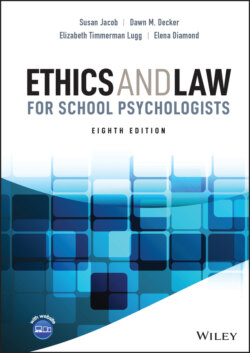Читать книгу Ethics and Law for School Psychologists - Susan Jacob - Страница 42
Case 1.4
ОглавлениеAfter several incidents of harassment of gay teens and students who do not conform to gender-role expectations, James Lewis, school psychologist, became increasingly convinced that the schools in his district were not a safe or supportive place for lesbian, gay, biattractional, or transgender (LGBTQ+8 ) youth. He began to read about the developmental needs and challenges of LGBTQ+ youth, and he spent time talking with LGBTQ+ teens about their experiences at school. He then formed alliances with school and community leaders who shared his concerns. Although he may face opposition, James will advocate for districtwide changes to reduce harassment and improve the school climate for LGBTQ+ youth (see Kosciw et al., 2020; NASP, 2017a; also Chapters 9 and 12).
James’s conduct (Case 1.4) is consistent with our ethical responsibility to speak up for the needs and rights of students even when it is difficult to do so (NASP Standard III.2.3) and to use our professional expertise “to promote school, family, and community environments that are safe and healthy for children and youth” (NASP Guiding Principle IV.1). School psychologists are ethically obligated to help ensure that all youth can attend school, learn, and develop their personal identities in an environment free from discrimination, harassment, violence, and abuse (NASP Guiding Principle I.3, Standards I.3.2, IV.1.2). Through advocacy and education of staff and students, James will work to foster a school climate that promotes not only understanding and acceptance of individual differences but also a respect for and valuing of those differences.
In keeping with our responsibilities to the communities in which we live and work, school psychologists know and respect federal and state law and school policies (NASP Guiding Principle IV.2; see Relationship between Ethics and Law later in this chapter). Also consistent with the broad principle of responsibility to schools, families, communities, the profession, and society, school psychologists monitor their own conduct to ensure that it conforms to high ethical standards, and they monitor the conduct of their professional colleagues. Self- and peer monitoring for ethical compliance safeguards the welfare of others and fosters trust in psychology (W. B. Johnson et al., 2012). If concerns about unethical conduct by another psychologist cannot be resolved informally through a collegial problem-solving process, practitioners take further action appropriate to the situation, such as notifying the practitioner’s work-site supervisor of their concerns or filing a complaint with a professional ethics committee (NASP Standard IV.3.2; also APA 1.04). (See the section titled Unethical Conduct later in this chapter.)
School psychologists also contribute to the profession by mentoring, teaching, and supervision: “As part of their obligation to students, schools, society, and their profession, school psychologists mentor less experienced practitioners and graduate students to assure high quality services, and they serve as role models for sound ethical and professional practices and decision making” (NASP Guiding Principle IV.4).
Finally, psychologists accept the obligation to contribute to the knowledge base of psychology and education in order to further improve services to children, families, and others and, in a more general sense, promote human welfare (CPA, 2017; also APA Principle B; NASP Guiding Principle IV.5). For this reason, they are encouraged to participate in, assist in, or conduct and disseminate research (NASP Guiding Principle IV.5). When school psychologists engage in research activities, they “respect the rights, and protect the well-being, of research participants” (NASP Standard IV.5.2) (see Chapter 10).
